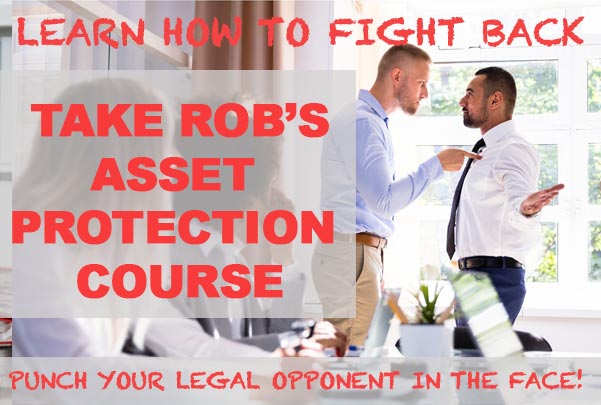Asset Protection and Bankruptcy
“Asset Protection” involves protecting assets (including cash, stocks, real estate, etc.) from being seized by creditors or plaintiffs. “Bankruptcy” is defined as a court proceeding in which an insolvent debtor’s assets are liquidated and the debtor is relieved of further liability. The passage of the “Bankruptcy Reform Act” changed the way an individual can file for bankruptcy (specifically “Chapter 7” and “Chapter 11”). Therefore, having a solid “Asset Protection Plan” in place while the financial (and legal) seas are calm can be quite beneficial.
Protecting your assets and the new bankruptcy law
Get an umbrella insurance policy
Recently, a retiree went to an asset protection specialist after his wife was involved in an automobile accident. The retiree had a net worth of $4 million, but his wife was being sued for $10 million. The attorney was astonished to find that the couple carried only $100,000 in auto liability coverage, and had no umbrella insurance policy.
The most important point of asset protection is to get an umbrella, one that will unfurl when the limits on your homeowner’s and auto liability insurance policies are exhausted. It costs under $200 a year to purchase a $1 million umbrella policy. A good umbrella policy should also cover you for miscellaneous events, such as having an accident on a rented motorbike, or liability if you do volunteer work. However, the list of “exclusions,” (i.e, items that aren’t covered) in most policies has grown over the past 15 years. Since exclusion lists vary, your best bet is to shop around based on your own risks. For instance: Most umbrellas exclude long-term pollution damage, but some will still cover damage from a sudden catastrophe, such as your in-ground heating oil storage tank springing a leak.
If you would like more information regarding asset protection, trusts, family limited partnerships or the subject of this article please call or email our office.
Stuff Your Retirement Accounts
In one of its few debtor-friendly provisions, the new bankruptcy law strengthened protection for retirement accounts. This means that any money that is in a qualified retirement plan, such as a 401(k), or even one being maintained by a solo owner, is exempt in bankruptcy, as is all money being rolled from a pension plan into an IRA and up to $1 million in both regular or Roth IRA accounts. Previously, IRAs and solo-owner plans had little protection in bankruptcy in all 50 states. So, if you’re having financial problems, you should continue to make contributions to your 401(k) and, if you have to, borrow from your 401(k). In Chapter 13, repayment of a 401(k) loan is now treated as a necessary expense.
While the new protection also extends to an IRA inherited by a spouse, it’s unclear whether it applies to IRAs inherited by a child. If your child is a potential liability or a creditor risk, then you put the IRA into a trust. (This can get a bit tricky: A trust can extend an IRA’s tax deferral and stretch out distributions, but only if all beneficiaries are individuals and only for the life expectancy of the trust’s oldest beneficiary.)
Essentially, if you’re fending off creditors in state courts, then the Federal pension law protects all but solo-owner pension plans; IRA protection depends upon the laws of the state.
If you would like more information regarding asset protection, trusts, family limited partnerships or the subject of this article please call or email our office.
The new bankruptcy law created an exemption for funds put into 529 college saving plans at least two years prior to filing for bankruptcy, just as long as the beneficiary is a child or grandchild. However, it should be remembered that, if you’re fending off creditors in a state court, then state laws apply, and they may not give as much protection. So, when a couple contributes to a 529, if one spouse is less likely than the other to be sued, the low-risk partner should be named the account’s “owner.”
If you would like more information regarding asset protection, trusts, family limited partnerships or the subject of this article please call or email our office.
If you own of a small business, or are self-employed, then it’s highly recommended that you insure and incorporate. For example, if you part-time delivery man hits a pedestrian, then a corporate shell, such as a limited liability company (LLC), provides an added layer of protection for your personal assets. If you own several rental properties, then holding each in a separate LLC should be taken into consideration. One word of warning: A shell won’t protect you from liability if you yourself are negligent; for example, you’re the architect of a building that collapses. That’s why both error and omission insurance is a good idea even it costs thousands. (Check your professional association; some offer attractive group rates.)
If you have the occasion to conduct business from your home, then you should get a business “endorsement” for your homeowner’s and umbrella policies. Otherwise, should you have either a delivery man or a client slip and fall on your steps, your insurer will probably tell you that you aren’t covered.
Finally, keep your business and personal debts separate: Never use your “small business” credit card for personal expenses. Furthermore, if you tap into your home equity to fund your business, always make sure that you keep records showing where the money went. The reason for this is that the provision in the new law denying a Chapter 7 “fresh start” to families with above-median income seems to be applicable only if what you owe is primarily “consumer debt.” If your debts stem mainly from business borrowings or a malpractice award, you should be able to use Chapter 7. Creditors may fight this line of reasoning, but it’s worth a shot.
If you would like more information regarding asset protection, trusts, family limited partnerships or the subject of this article please call or email our office.
You should familiarize yourself with your state’s exemptions and property laws. This arcane information could affect how you hold and title your assets, and even whether you should purchase term insurance or invest in a whole life policy. For example: In the state of Illinois, the homestead exemption is only $7,500. However, you can protect the entire cash value of the life insurance and annuities so long as the beneficiary is a dependent. There is no homestead exemption in the state of Maryland, but it’s one of the states allowing you to hold property as “tenants by the entirety.” Which means, generally, creditors of just one spouse can’t reach property titled this way.
If you would like more information regarding asset protection, trusts, family limited partnerships or the subject of this article please call or email our office.
The best time for you to transfer your assets, perhaps to your spouse, children or a family partnership, is before you’re sued or being threatened with a suit. Otherwise, a court could decide that you had the intention to stiff your creditors, whereby the court would brand the transfer “fraudulent” and reverse it. The new bankruptcy law encourages judges to look back at transfers for longer periods before a bankruptcy filing. One section even created a special ten-year lookback for transfers to certain trusts you might have created for yourself. Since 1997 seven states passed laws protecting assets in such “self-settled spendthrift” trusts from creditors. What’s now unclear is how well these trusts will protect assets for the out-of-staters who use them. It’s better to transfer assets into a straightforward trust for both your children and grandchildren and to do it as part of your estate planning.
If you would like more information regarding asset protection, trusts, family limited partnerships or the subject of this article please call or email our office.
Under the new Federal bankruptcy law, even if only one spouse files for bankruptcy, the other’s future earnings might still be at risk. For instance, let’s say that one spouse’s income from a job supports the family, while the other spouse is running a struggling business. If the entrepreneur goes bankrupt, some of what the solvent spouse has spent on the family is imputed as income to the bankrupt one, which makes the bankrupt spouse ineligible for a Chapter 7 fresh start, and it could boost the amount he must pay each month for five years in Chapter 13. The cold-hearted solution: Prior to filing for bankruptcy, you should file for a divorce.
If you would like more information regarding asset protection, trusts, family limited partnerships or the subject of this article please call or email our office.

bankruptcy
-
Part One: Get an umbrella insurance policy
-
Part Two: stuff your retirement accounts
-
Part Three: fund education accounts
-
Part Four: limit your business risks
-
Part Five: brush up on your state law
-
Part Six: transfer assets early
-
Part Seven: unhitch
-
The new bankruptcy law and discharging of taxes
-
Creditors and fraudulant transfer
NEWSLETTER SIGNUP!
[forminator_form id=”1485″]

FIGHTING BACK!
